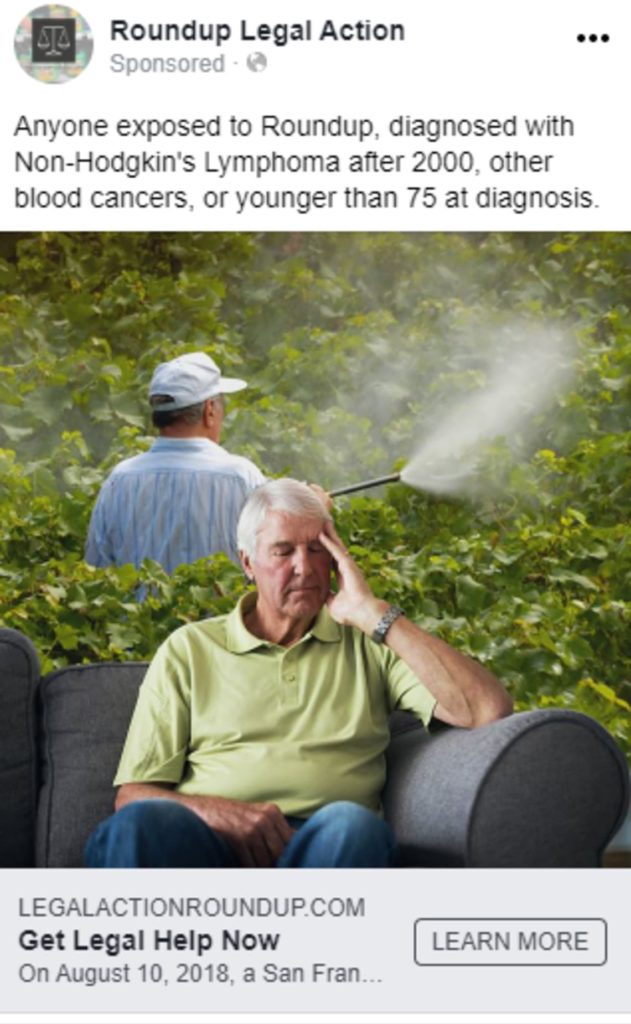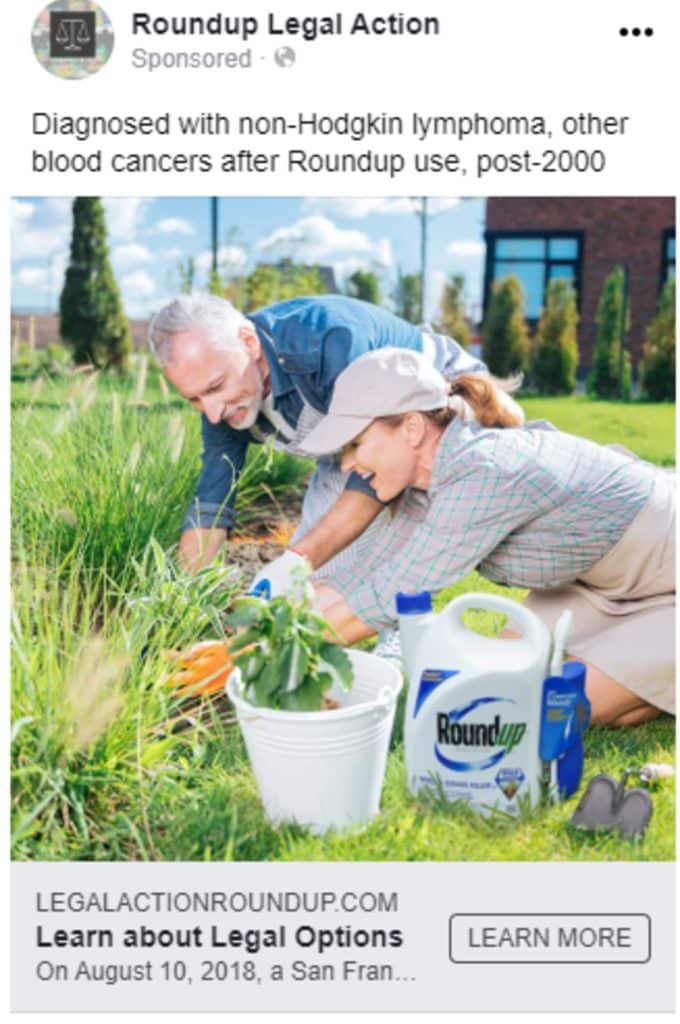Roundup (Weed Killer)
- Roundup Litigation
- What Is the Current Status of the Roundup Products Lawsuits?
- Are There Lawsuits Against Roundup That Have Already Settled?
- Has Bayer Won Any Case in the Roundup Litigations?
- Are the Class Action Lawsuits and MDLs Against Roundup Still Ongoing?
- Who Can File a Roundup Lawsuit?
- What Plaintiff Law Firms Should Know About the Dangers and Risks Caused by Glyphosate Broad-Spectrum Systemic Herbicide
- Why Is Roundup Being Recalled?
- How Your Firm Can Take Action Against Roundup
- TV Commercials
- Infomercials
- Landing Pages
- Social
Roundup Litigation
Roundup is a popular agricultural weed killer that has been around since the 1970s. It’s a product of Monsanto, and since its launch, farmers, gardeners, and landscapers across the globe have sprayed more than 19 million pounds of this pesticide to help them get rid of weeds. Around 20% of this estimate is from U.S. farmers alone.
Monsanto firmly believes in the safety and integrity of Roundup. In 1996, the company genetically engineered “Roundup Ready” corn and soybean crops. Entire fields could be sprayed over the course of planting and harvesting, reducing the impact of weeds on growing crops and increasing the overall yield for farmers.
Earlier in the 1990s, Monsanto marketed Roundup as “biodegradable,” “safer than table salt,” “practically non-toxic,” and “stayed where you put it.” These statements were widely disputed, and in 1996, New York’s attorney general sued Monsanto for false advertising, winning the case and forcing the company to discontinue advertising using these false claims.
The success of Roundup’s ability to kill weeds makes it a very effective solution for managing crops and gardens, but there’s just one problem. Roundup’s principal active ingredient is glyphosate, a component that some experts believe is a carcinogen. To make matters worse, this dangerous component, often sprayed on fruits and vegetables, has made its way from farms into grocery stores, restaurants, and homes across the country. For this reason, avoiding exposure to glyphosate is increasingly difficult.
In 2018, the pharmaceutical company Bayer acquired Monsanto for a staggering $66 billion. Now Bayer is facing thousands of lawsuits alongside settlements worth billions of dollars due to the health and environmental damage caused by the glyphosate found in their products.
What Is the Current Status of the Roundup Products Lawsuits?
Before diving into current Roundup lawsuits, it’s important to note critical milestones in Roundup’s history. Here’s a quick timeline summarizing the past eight years:
- 2013: The first study highlighting that glyphosate could cause cancer in humans is published.
- 2015: The world health organization (WHO), through the International Agency for Research on Cancer, classifies glyphosate as “probably carcinogenic to humans.” During this year, the first product liability lawsuit against Roundup’s manufacturer is filed.
- 2016: Other studies linking glyphosate with lymphoma and various forms of skin cancer are published. Later in the year, Bayer announces its plans to acquire Monsanto.
- 2017: The first wave of mass tort litigation against the weed killer is filed, in addition to hundreds of individual lawsuits.
- 2018: The Department of Justice approves the Bayer-Monsanto merger. In August, the first case against Roundup goes to trial, and the verdict costs Bayer $289 million. Even though the company defends its products publicly, its stocks still plummet.
- 2019: The second case against Roundup goes to trial, and Bayer faces another loss as the jury awards the plaintiff $2 billion.
- 2020: Bayer agrees to a global settlement agreement worth $10 billion to resolve existing claims, in addition to the formation of a scientific panel to conclude whether glyphosate causes cancer, and if it does, what is the minimum level of exposure that poses a danger.
- 2021: In May, U.S. District Judge Vince Chhabria in San Francisco denied Bayer’s $2 billion class-action proposal to resolve future Roundup lawsuits, calling the proposal “clearly unreasonable.” In August, Bayer set aside $4.5 billion to resolve any future claims.
- 2023: There are still over 4,000 cases pending in the Roundup cancer MDL in federal courts. The focus of these cases has shifted to state court, where there are still tens of thousands of cases pending and being filed.
- 2024: $2.25 Billion Verdict – A jury in the Philadelphia Court of Common Pleas found that McKivison’s non-Hodgkins lymphoma was the result of using Roundup for yard work at his home over the span of several years. The verdict includes $250 million in compensatory damages and $2 billion in punitive damages. Bayer believes that they can appeal and get the verdict decreased. This is the third verdict against Monsanto-Bayer in Philadelphia courts.
Part of Bayer’s defense includes testimony by Dr. Donna Farmer, who has been studying chemicals at the company for over two decades. She disagrees with the allegations that glyphosate is a carcinogen and has accused the World Health Organization of being biased with their findings and cherry-picking the data. She also accused the WHO of misinterpreting the studies and highlighted that glyphosate targets a specific enzyme available only in plants, not humans.
As made apparent by the most recent rulings, judges and juries seem to disagree with Dr. Farmer’s argument, maintaining that Roundup has been liable in many cases brought before the court.
Are There Lawsuits Against Roundup That Have Already Settled?
Yes, and most of the plaintiffs who have gone to trial have won significant settlements, exceeding expectations. So far, juries are holding Roundup’s manufacturer accountable and awarding substantial punitive damages.
Here are the most notable verdicts in the Roundup lawsuits.
Johnson v. Monsanto, August 2018
Awarded damages: $289.2 million
This case involved a 46-year-old man, Dewayne Lee Johnson. He was a groundskeeper at Benicia Unified School District, where he used Roundup during his work at the school between 2012 and 2015. In 2014, Johnson started experiencing acute skin irritation. He reported his condition to health care providers and reached out to Monsanto, fearing it resulted from repeated use of Roundup.
Johnson’s attorneys later obtained emails revealing that Monsanto employees did, in fact, discuss his query internally. Since Monsanto never replied to him, Johnson continued to use the weedkiller. He was later diagnosed with a form of non-Hodgkin lymphoma with a large cell transformation known as mycosis fungoides in August of the same year. Unfortunately, his job still required him to use Roundup, and even after undergoing chemotherapy, his cancer progressed.
This case went to trial for eight weeks in San Francisco County in California state court, after which the jury decided Monsanto was liable. The plaintiff was awarded total damages amounting to $289 million, including punitive damages of $250 million. The jury justified this massive settlement because they found Monsanto guilty of acting with conscious disregard for human health. However, the judge capped the final amount, reducing the total amount awarded to $78.5 million.
Hardeman v. Monsanto , February 2019
Awarded damages: $80.2 million
The Hardeman v. Monsanto case was the first federal court case from the Roundup litigation to go to trial. The plaintiff was a 70-year-old male that lived with his wife on a 56-acre piece of land in Sonoma County, California. They used this as a sanctuary for exotic animals and began using Roundup in the 1980s to treat overgrowth, weeds, and poison oak. Their heavy use of Roundup continued through 2012. Three years later, Hardeman was diagnosed with non-Hodgkin lymphoma. The jury awarded him $80 million, including $75 million worth of punitive damages, but the judge reduced the final award to $25 million.
Hardeman v. Monsanto was a bellwether case, or a test trial, that gave all affected parties a glimpse into what the future could hold for over 1,600 plaintiffs that had consolidated their lawsuits in San Francisco’s Federal Court.
Pilliod v. Monsanto, May 2019
Awarded damages: $2.055 billion
This case involved a husband and wife from Livermore, California, who were in their 70s. They used Roundup regularly around their home as well as other properties. The husband was later diagnosed with large B-cell non-Hodgkin lymphoma. His wife suffered from central nervous system lymphoma, which later progressed to non-Hodgkin lymphoma. This case was tried in Alameda County, resulting in the largest awarded damages against Monsanto totaling $2,055,206,173, including $2 billion in punitive damages.
Monsanto’s attorneys attempted to file a motion for a new trial on the basis that the jury’s findings were not based on substantial evidence and that the court admitted evidence that should not have been allowed, influencing the jury’s decision and their monumental settlement amount. The court denied the request contingent on the plaintiff’s agreement to a lower settlement amount. The husband and wife agreed, walking away with a combined award of $76 million.
Stephens v. Monsanto, August 2020
Awarded damages: Trial ongoing
Stephens v. Monsanto is the fourth case in the Roundup litigation to go to trial, and it’s currently ongoing in California. The hearing is happening virtually, making it one of the first digital trials in the United States.
The plaintiff, Donnetta Stephens, filed her lawsuit in the Superior Court of California for Alameda County in 2020. She was a dedicated home-gardener and used Roundup for over 20 years to kill weeds in her yard. When Stephens was in her early 70s, she was diagnosed with high-grade B-cell lymphoma, after which her health deteriorated rapidly.
Due to her age and delicate medical condition, she filed for an expedited, preferential trial, and her motion was granted. Her jury trial began one year after her initial claim, although it was moved to a different court to accommodate her request for an expedited trial. The outcome of this trial is yet to be determined.
Has Bayer Won Any Case in the Roundup Litigations?
In October 2021, Bayer won its first case, Clark v. Monsanto, in the Roundup trials heard in Los Angeles County Superior Court. The plaintiff, 9-year-old Ezra Clark, and his mother alleged that the child was diagnosed with a rare form of non-Hodgkin lymphoma after consistent exposure to Roundup, which his mother used in their garden. Ezra suffers from Burkitt lymphoma, a type of non-Hodgkin lymphoma that spreads to the central nervous system and can impact the bone marrow, spleen, and liver.
According to Ezra Clark’s mother, Ezra was directly exposed to the weed killer multiple times when he would accompany his mother while she sprayed Roundup. Ezra’s mother also highlighted that her son has autism, and playing outdoors is an activity that helps moderate his temperament. Ezra’s frequent outdoor playtime meant that he was often exposed to Roundup while playing in areas his mother recently sprayed.
During the trial, it was determined that Ezra’s exposure to the weed killer lasted for a cumulative period of 80 hours. Ezra’s lawyer highlighted studies showing that Roundup impacts the skin in three main ways: killing the cells, causing DNA damage, and ultimately causing Burkitt lymphoma.
This condition impacts the body’s ability to repair sustained damage to the skin. Ezra’s lawyer also stated that Ezra’s mother has cervical cancer that had metastasized to her brain. This diagnosis made it difficult for her to recall specific details, leading to multiple errors in her depositions with Monsanto’s lawyers. She was, however, consistent on how often she used Roundup, which was every weekend.
The defense attorney highlighted inconsistencies in Ezra’s mother’s testimony, leaving her son’s exposure to Roundup in doubt. Some of her family members had also made statements that they never saw her spray the weed killer around her son. The jury concluded that his exposure to Roundup was not a substantial factor in his diagnosis based on his medical history. This case was planned for two phases due to a bifurcation order. Phase one would cover the evidence of the plaintiff’s exposure to Roundup and whether it was a substantial factor in his diagnosis. If the plaintiff had won the first phase, the trial would have proceeded to phase two. Their loss, however, ended the trial.
This trial is the first win for Bayer. It’s important to note that this does not significantly change expected settlement amounts for newly filed lawsuits. Ezra Clark was diagnosed with a very rare form of non-Hodgkin lymphoma, Burkitt lymphoma. Due to the unique circumstances of his case, it was exceedingly difficult to prove that his condition was a result of his exposure to Roundup. Claims of more common forms of non-Hodgkin lymphoma are supported by substantial medical literature linking Roundup to cancer, making these types of cases far more straightforward.
Are the Class Action Lawsuits and MDLs Against Roundup Still Ongoing?
The multidistrict litigation (MDL), commonly referred to as the Roundup MDL, was formed in 2016 and is still in place. The MDL comprises several consolidated claims against Roundup in the federal court in the Northern District of California. The Roundup MDL aims to make it easier for people with non-Hodgkin lymphoma to participate in future settlements
Who Can File a Roundup Lawsuit?
In order to file a suit against Roundup, a plaintiff must have reasonable cause to hold the company liable for health concerns resulting from Roundup exposure.
The three main categories of plaintiffs who have a viable case to submit against Roundup are:
- Direct victims: These are the people who have been diagnosed with forms of non-Hodgkin lymphoma, any other type of cancer, or diseases associated with Roundup’s exposure.
- Estate managers: Estate managers are the people in charge of managing the estate of a suspected Roundup victim. They could be a legal representative, family member, or a close friend.
- Family members: In the case of a suspected Roundup-related death, the dependents or immediate family members of a victim can file a wrongful death claim showing that the deceased’s illness resulted from Roundup exposure.
What Plaintiff Law Firms Should Know About the Dangers and Risks Caused by Glyphosate Broad-Spectrum Systemic Herbicide
With the exception of certified organic foods, a large portion of produce and meats will have trace amounts of glyphosate. However, the biggest problem lies in the direct use among farmers, gardeners, landscapers, and other people who have used Roundup in their day-to-day lives. Extensive use of glyphosate-based herbicides over the past decades increases the likelihood of current and future health problems linked to Roundup.
Newly diagnosed cases are still viable for lawsuits, which means that there will be many potential plaintiffs looking to take Roundup manufacturers to court. The most commonly litigated health conditions due to Roundup exposure include B-cell lymphoma, mantle cell lymphoma, leukemia, and non-Hodgkin lymphoma.
Reaching injured parties is an essential first step in demonstrating the value your firm can provide when tackling large corporate companies trying to deny accountability. It’s up to you to convince them that their fight for justice is your fight for justice. The good news is that you don’t have to face this challenge alone. Contact camginc.com to learn how we can help you with your consumer law firm outreach and marketing strategies.
Why Is Roundup Being Recalled?
Roundup is the most popular weed killer globally. It is commonly used in gardens, lawns, patios, playgrounds, parks, farms, and more. This glyphosate-based herbicide is known for killing the toughest weeds, making it a very effective tool for getting rid of these unwanted garden pests. While Roundup successfully fulfills its primary claim, the product is under recall due to its main ingredient, glyphosate, a suspected carcinogen.
In 2015, one of the leading cancer research centers globally, the International Agency for Research on Cancer (IARC), conducted a study and found tumors in animals exposed to glyphosate. They also found out that farmers who used the weed killer were at a higher risk of suffering from various forms of cancer.
Bayer, Monsanto’s parent company, announced that all products with glyphosate would be pulled from the U.S. consumer market and replaced by a new formula that doesn’t include glyphosate. Bayer was careful to emphasize that this move was not proof that its products were harmful but rather a form of protection against future lawsuits.
A Quick Overview of Glyphosate
Glyphosate, also known as N-phosphonomethyl-glycine, is one of the most commonly used ingredients in herbicides worldwide. This component is widely used in agriculture because it is highly effective and affordable. Glyphosate quickly kills weeds and grasses that harm crops. While glyphosate’s largest market is in the agricultural industry, some countries use it to control weed growth in non-cultivated spaces such as highways and industrial areas, in addition to home gardening and forestry.
Glyphosate is a popular ingredient in most herbicides, and it works by blocking the plants’ pathways, causing them to wither and eventually die. Once applied to a plant, the leaves absorb the chemical and pass it down to the roots, preventing the plant from producing various proteins that are crucial to its growth. Since glyphosate is non-selective, most plants die after exposure.
Does Glyphosate Cause Cancer?
There is a strong debate regarding Roundup’s active ingredient, glyphosate, and its potential to be a carcinogen. Manufacturers like Monsanto maintain that the use of glyphosate in products such as Roundup is perfectly safe. Part of their defense remains that the Environmental Protection Agency (EPA) continues to designate glyphosate as safe when used according to product label instructions. The EPA schedules a 15-year review of all registered pesticides. Facing a wave of concern from public citizens, the EPA released an interim decision in 2020 stating again that glyphosate poses no apparent risk to users. This finding concurred with the European Food Safety Authority (EFSA) statement back in 2015 that glyphosate is an unlikely carcinogen.
In a separate study, the World Health Organization released a report listing glyphosate as “probably carcinogenic to humans.” Despite the debate of Roundup’s carcinogen risk, research has linked its consistent use to various forms of cancer, including non-Hodgkin Lymphoma, B-cell lymphoma, and leukemia. In 2019, a study was published in the journal Mutation Research, linking non-Hodgkin lymphoma and high-use exposure to Roundup. This study highlighted a 41% increase in the risk of developing non-Hodgkin lymphoma for people exposed to glyphosate-based herbicides.
Another link between Roundup and non-Hodgkin lymphoma was established 17 years ago in 2003 during a study involving 3,400 Midwest farmworkers. The Journal of Occupational and Environmental Medicine later published a study questioning the safety of using glyphosate.
In 2017, OEHHA, the state of California’s Office of Environmental Health Hazard Assessment, listed glyphosate as a cancer-causing chemical, making California the first state to make this type of health claim against glyphosate.
What is Non-Hodgkin Lymphoma?
Non-Hodgkin lymphoma (NHL), the most common type of cancer associated with Roundup’s use, affects the lymphatic system. It occurs when the body creates an excess of abnormal white blood cells. Studies by the American Cancer Society reveal that the survival rate of people with this type of cancer within a five-year timeframe is around 72%, but this also depends on the unique genetic makeup of the affected person and any other underlying conditions.
The main symptoms of non-Hodgkin lymphoma include:
- Swollen lymph nodes
- Weakness and fatigue
- Bloody stool or vomit
- Accumulation of fluid, pain, or swelling in the abdomen
- Coughing, wheezing, or shortness of breath
- Fever, night sweats, and chills
- Bone pain
- Blockage of urine flow
Treating non-Hodgkin lymphoma will vary from patient to patient. Different options recommended by a physician, such as an oncologist or hematologist, include:
- Chemotherapy
- Immunotherapy
- Targeted drug therapy
- Radiation therapy
- High-dose chemotherapy and stem cell transplant
- Surgery
Based on the type of treatment and the severity of the diagnosis, treating non-Hodgkin lymphoma can significantly impact a patient’s daily life, reducing their capacity to work, raise a family, or participate in other activities that support positive quality of life.
Are There Additional Long-Term Health Effects to Glyphosate Exposure?
According to Dr. Stephanie Seneff, a senior research scientist at MIT, “glyphosate will go down in history as the worst synthetic chemical this planet has ever faced, as a consequence of its perceived non-toxicity to humans and its massive use in agriculture and on people’s lawns with careless handling due to lack of awareness of its insidious, cumulative toxicity.”
Dr. Seneff believes that continued exposure to glyphosate is akin to poisoning the body, where the chemical slowly breaks down essential functions that support healthy body and mind processes. These effects include:
- Disrupting the body’s intake of minerals
- Reducing the body’s natural ability to detoxify caused by reduced sulfate supply
- Impairing enzyme function
- Interrupting the natural release of mood-regulating hormones
- Harming the gut’s microbiome, leading to a weakened immunity
- Impacting the natural relationship between pathogens and beneficial biota in the gut
- Replacing glycerine in protein chains, disrupting the body’s shikimate, or metabolic, pathway
These negative effects of glyphosate have been linked to various illnesses. Besides the notable risks of cancer, additional long-term health effects of glyphosate exposure are:
- Chronic kidney disease: When combined with other factors, like dehydration, metal toxicity, and a nutritionally deficient diet, exposure to glyphosate can cause kidney failure. In warmer climates, glyphosate can accelerate the effect of these risks, increasing the probability of chronic kidney disease, particularly in agricultural workers.
- Heart disease: This type of illness often occurs when glyphosate agitates the body’s natural enzymes, causing dysfunction linked to cardiovascular diseases. According to the Centers for Disease Control and Prevention, heart disease is the leading cause of death in the United States, where someone dies every 36 seconds due to cardiovascular-related illness.
- Liver disease: A new study conducted by researchers at the University of California, San Diego, linked liver damage found in patients with elevated urine levels of glyphosate. The presumed area of exposure seems to be through diet.
- Infertility: A study highlighted that glyphosate has toxic effects on the reproductive system, even when found in low doses. It revealed that glyphosate-based herbicides affect the development of the uterus and ovarian follicles, impacting fertility.
- Autism: Current scientific research highlights a possible link between glyphosate exposure and various signs associated with autism. Maternal exposure seems to be the highest risk, where pregnant women are exposed during work-related responsibilities. Another correlation was found between the increased use of glyphosate on corn and soy crops between 1995 and 2010 and the reported numbers of children with autism in U.S. public schools.
- Celiac disease: In one study where fish were exposed to glyphosate herbicide, researchers found that some fish developed digestive problems similar to those of people with celiac disease. Some of the parallels between celiac disease and glyphosate exposure include depletion of amino acid, imbalances in gut bacteria, certain mineral deficiencies, and the impairment of enzymes that are crucial in eliminating toxins from the environment.
- Alzheimer’s disease: The use of glyphosate in herbicides could be a high-risk factor in developing neurodegenerative diseases like Alzheimer’s. Exposure to these herbicides is linked to brain glutamatergic excitotoxicity, a key feature of this common form of dementia.
- Shorter pregnancies: A study done in Indiana found that more than 90% of women surveyed had detectable amounts of glyphosate, correlating to shortened gestational length.
- Attention deficit hyperactivity disorder (ADHD): This medical condition impacts brain development and causes symptoms often found in children and teens, including an inability to focus, sit still, and maintain self-control. A study by Dr. Seneff found a staggering correlation between the increased use of glyphosate on soy and corn crops and the number of reported cases of ADHD.
There’s also research underway that is analyzing constant exposure to glyphosate and the development of depression, Parkinson’s, ALS, and more.
Who Is at Most Risk of Being Impacted by Roundup?
Roundup exposure occurs in three primary ways: consuming food that has already been tainted or treated with glyphosate, direct skin absorption, and inhalation through the nose or mouth. Despite a high likelihood of glyphosate exposure among the general public in trace amounts, those with the highest risks are people who work in close contact with products like Roundup, including:
- Groundskeepers
- Professional gardeners
- Agricultural workers
- Landscapers
- Farmers
- Home gardeners
How Your Firm Can Take Action Against Roundup
Companies offering products to the public are responsible for ensuring the safety of their formulas, in addition to sufficiently warning consumers of the risks of using potentially dangerous chemicals. Without recommended safety measures, consumers risk exposure to harmful chemicals that can cause life-threatening health complications and even death.
The Roundup litigation cases are likely to continue as more people start experiencing the effects of constant exposure to Roundup. Claims against Roundup are still viable for victims newly diagnosed with cancer or other suspected ailments related to Roundup exposure.
If you’re an attorney seeking to bring claims against Roundup, our team is ready to help. We can produce high-quality marketing content and media campaigns that generate traffic and increase client sourcing. From compelling landing pages to TV commercials and social media posts, we offer resources that help firms pursue mass tort litigation against manufacturers like Monsanto. Contact camginc.com today for assistance in attorney marketing.
TV Commercials
Infomercials
Landing Pages

Social


CAMG has thousands of spots and infomercials that can be branded for your firm. Reach out to us for the latest creative offline and online examples*.
*Examples shown are not always current examples.
Request Samples
* These fields are required.

Is your firm in the Top 3 of Google Search?

CAMG Ethics White Paper
Legal Areas
Are you looking for data-driven marketing for your law firm?
I have worked with CAMG for years. Not only are they great at delivering, but they are great people to work with!

CAMG is always accommodating and willing to work in a way that supports your office as an extension of your team.

Steve Nober and the team at CAMG are responsive, ethical, talented, reasonably priced, and easy to work with!

If you are looking for professional, hardworking people who produce great results and then take you out for a nice dinner, look no further than CAMG


THE NATION’S LARGEST FULLY INTEGRATED
Marketing Agency Dedicated to Law Firms
- Television
- Radio
- Public Relations
- Medical Record Retrieval & Review
- Search Engine Optimization
- Paid Digital
- Out of Home
- Intake & Contracting Services
